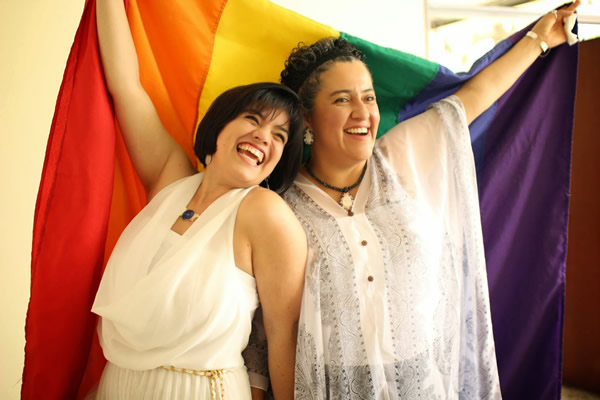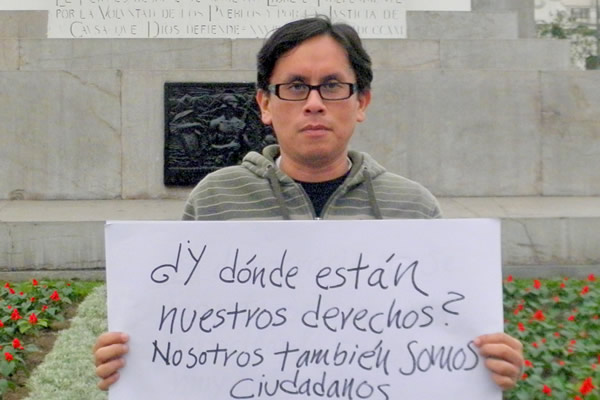News
Marriage efforts in Latin America advance amid resistance
A Colombian judge annulled a gay couple’s marriage on October 2.


Caludia Zea and Elizabeth Castillo married in Gachetá, Colombia, on September 25. (Photo by Paola Zuluaga)
A civil judge in Bogotá, the Colombian capital, on September 20 married Julio Albeiro Cantor Borbón and William Alberto Castro Franco. Elizabeth Castillo and Claudia Zea tied the knot five days later in a ceremony in Gachetá in the province of Cundinamarca that Judge Julio González officiated.
Another Bogotá judge on October 4 married Adriana Elizabeth González and Sandra Marcela Rojas.
Colombia’s Constitutional Court in 2011 ruled gays and lesbians could seek legal recognition of their relationships within two years if lawmakers in the South American country did not extend to them the same benefits heterosexuals receive through marriage.
The Colombian Senate in April overwhelmingly rejected a bill that would have extended marriage rights to gays and lesbians. And the Constitutional Court’s June 20 deadline passed amid lingering confusion as to whether same-sex couples could actually marry in the country.
Many notaries have said they will allow gays and lesbians to enter into a “solemn contact” as opposed to a civil marriage.
A Bogotá judge in July solemnized Carlos Hernando Rivera Ramírez and Gonzalo Ruiz Giraldo’s relationship. Marcela Sánchez, executive director of Colombia Diversa, an LGBT advocacy group, and other activists maintain the two men and other same-sex couples whose relationships have been formally recognized are legally married.
“I am not doing any type of favor; it is not important that I may be sympathetic to the LGBTI movement or that I am from a liberal political group,” Julio González told the Colombian newspaper El Espectador after he married Castillo and Zea. “These things cannot dictate whether a judge acts according to the law and the Constitution.”
A Bogotá judge on October 2 annulled Cantor and Castro’s marriage after a group opposed to nuptials for gays and lesbians challenged it in court. The organization has said it plans to file suit against Julio González and other judges who have officiated same-sex marriages.
Out Bogotá City Councilwoman Angélica Lozano on September 30 also filed a complaint against Inspector General Alejandro Ordoñez, who vehemently opposes nuptials for gays and lesbians, for ordering notaries to report any same-sex couple who seeks a marriage licenses to his office.
“I am legally denouncing the inspector general for abuse of power, arbitrary acts and injustices against homosexuals,” Lozano tweeted after she filed her complaint.
Mexican, Chilean advocates push for marriage
Argentina and Uruguay are among the 14 countries in which gays and lesbians can legally marry.
Brazil’s National Council of Justice in May ruled registrars in the South American country cannot deny marriage licenses to same-sex couples. São Paulo and other Brazilian states had already extended marriage rights to same-sex couples, but the country’s lawmakers have yet to pass a nationwide gay nuptials bill.
The Mexican Supreme Court in February unveiled its decision that found a law in the state of Oaxaca that bans same-sex marriage unconstitutional.
Same-sex couples have been able to legally marry in Mexico City since 2010, and the Mexican Supreme Court has ruled that states must recognize these unions.
A gay couple in Mérida on the Yucatán Peninsula exchanged vows in August after a federal judge said they could tie the knot. Judges in the states of Chihuahua and México in recent months have also ruled in favor of same-sex couples seeking marriage rights.
Gays and lesbians in Jalisco, in which the resort city of Puerto Vallarta is located, and other Mexican states have also begun to petition local authorities to allow them to marry.
Chilean LGBT rights advocates continue to pressure President Sebastián Piñera to allow gays and lesbians to tie the knot after the Inter-American Court of Human Rights in July gave the country’s government a two month deadline to respond to a same-sex marriage lawsuit the group Movement for Homosexual Integration and Liberation (Movilh) filed in 2012.
Movilh said in an October 3 press release that two members of Piñera’s cabinet with whom it met assured them the government has already begun the “process of internal consultations” to respond to its lawsuit.
More than 40 Chilean lawmakers on October 8 urged Piñera to make a bill that would allow gays and lesbians to enter into civil unions a priority before he leaves office early next year.
Former President Michelle Bachelet, who is the frontrunner to succeed Piñera in the country’s presidential elections that will take place on November 17, earlier this year publicly backed marriage rights for same-sex couples.
“More than two million people live together in Chile and they find a lack of this law socially and judicially indefensible,” the letter to Piñera reads. “They remind you that your presidential platform clearly referenced these topics.”
Civil unions bill introduced in Perú
Peruvian Congressman Carlos Bruce last month introduced a bill that would allow same-sex couples to enter into civil unions. It would extend economic benefits to them, but not adoption rights.
Victor Cortez and his boyfriend, Antonio Capurro, formed the group Plural Perú to help build support for the civil unions measure and expanded LGBT rights in the country. The two activists told the Washington Blade during an interview from the Peruvian capital of Lima on Tuesday the bill faces an uphill battle before lawmakers consider it in March.
A recent poll found 65 percent of Peruvians oppose any efforts to allow same-sex couples to enter into a civil union. Lima Archbishop Juan Luis Cipriani and Evangelicals are among those who frequently speak out against gays and lesbians and any proposal to legally recognize their relationships.
Cortez told the Blade he feels machismo and conservative attitudes within Peruvian society will continue to hamper efforts to extend marriage rights to same-sex couples.
“These types of unions go against these values,” he said. “For them this is very unacceptable.”

Texas state Rep. James Talarico won a hard-fought primary Tuesday to become the state’s Democratic nominee for U.S. Senate, defeating U.S. Rep. Jasmine Crockett in one of the year’s most closely watched and competitive Democratic contests.
Talarico, a Presbyterian seminarian and three-term lawmaker from Round Rock, was declared the winner by the Associated Press early Wednesday morning after a closely tracked vote count that drew national attention.
“Tonight, the people of our state gave this country a little bit of hope,” Talarico told the AP. “And a little bit of hope is a dangerous thing.”
With 52.8% of the vote to Crockett’s 45.9%, Talarico secured the nomination outright, avoiding a runoff and capping months of sharp contrasts between the two candidates over strategy, messaging, and how best to compete statewide in Texas. Democrats hope the competitive primary — and the relatively narrow margin — signals growing momentum in a state that has not elected a Democrat to the U.S. Senate since 1988.
Talarico has long expressed support for the LGBTQ community, a position he highlights prominently on his campaign website. Under the “Issues” section, he directly addresses assumptions that might arise from his faith and background as a seminarian in a deeply conservative state.
“My faith in Jesus leads me to reject Christian Nationalism and commit myself to the project of democracy,” his website reads. “Because that’s the promise of America: a democracy where every person and every family — regardless of religion, race, gender, sexual orientation, or any other difference between us — can truly be free and live up to their full potential.”
Crockett struck a conciliatory tone following her defeat, emphasizing party unity ahead of November.
“This morning I called James and congratulated him on becoming the Senate nominee,” Crockett told Politico. “Texas is primed to turn blue and we must remain united because this is bigger than any one person. This is about the future of all 30 million Texans and getting America back on track.”
Talarico also drew national attention earlier in the race when “Late Show” host Stephen Colbert said he was initially unable to air an interview with the state legislator due to potential FCC concerns involving CBS. The episode sparked a broader political debate.
Brendan Carr, chair of the Federal Communications Commission, appointed by President Donald Trump, told reporters the controversy was a “hoax,” though he also acknowledged Talarico’s ability to harness the moment to build support as an underdog candidate. The interview was later released online and garnered millions of views, boosting Talarico’s national profile.
In November, Talarico will face the winner of the Republican primary between incumbent Sen. John Cornyn and Texas Attorney General Ken Paxton, who have been locked in a bruising GOP contest. Rep. Wesley Hunt was also in the Republican primary field. The GOP race is expected to head to a May runoff.
In a joint statement, Senate Minority Leader Chuck Schumer and Democratic Senatorial Campaign Committee Chair Kirsten Gillibrand praised Talarico’s victory and framed him as a candidate capable of broad appeal.
“As an eighth-generation Texan, former middle school teacher, and Presbyterian seminarian, James will be a fighter for Texans from all walks of life and of all political stripes,” they said. “In November, Texans will elect a champion for working people: James Talarico.”
Maryland
Md. Commission on LGBTQIA+ Affairs released updated student recommendations
LGBTQ students report higher rates of bullying, suicide

The Maryland Commission on LGBTQIA+ Affairs has released updated recommendations on how the state’s schools can support LGBTQ students.
The updated 16-page document outlines eight “actionable recommendations” for Maryland schools, supplemented with data and links to additional resources. The recommendations are:
- Developing and passing a uniform statewide and comprehensive policy aimed at protecting “transgender, nonbinary, and gender expansive students” against discrimination. The recommendation lists minimum requirements for the policy to address: name, pronoun usage, and restroom access.
- Requiring all educators to receive training about the specific needs of LGBTQ students, by trained facilitators. The training’s “core competencies” include instruction on terminology, data, and support for students.
- Implementing LGBTQ-inclusive curricula and preventing book bans. The report highlights a “comprehensive sexual education curriculum” as specifically important in the overall education curriculum. It also states the curriculum will “provide all students with life-saving information about how to protect themselves and others in sexual and romantic situations.”
- Establishing Gender Sexuality Alliances “at all schools and in all grade levels.” This recommendation includes measures on how to adequately establish effective GSAs, such as campaign advertising, and official state resources that outline how to establish and maintain a GSA.
- Providing resources to students’ family members and supporters. This recommendation proposes partnering with local education agencies to provide “culturally responsive, LGBTQIA+ affirming family engagement initiatives.”
- Collecting statewide data on LGBTQ youth. The data on Maryland’s LGBTQ youth population is sparse and non-exhaustive, and this recommendation seeks to collect information to inform policy and programming across the state for LGBTQ youth.
- Hiring a full-time team at the Maryland Department of Education that focuses on LGBTQ student achievement. These employees would have specific duties that include “advising on local and state, and federal policy” as well as developing the LGBTQ curriculum, and organizing the data and family resources.
- Promoting and ensuring awareness of the 2024 guidelines to support LGBTQ students.
The commission has 21 members, with elections every year, and open volunteer positions. It was created in 2021 and amended in 2023 to add more members.
The Governor’s Office of Communication says the commission’s goal is “to serve LGBTQIA+ Marylanders by galvanizing community voices, researching and addressing challenges, and advocating for policies to advance equity and inclusion.”
The commission is tasked with coming up with yearly recommendations. This year’s aim “to ensure that every child can learn in a safe, inclusive, and supportive environment.”
The Human Rights Campaign’s most recent report on LGBTQ youth revealed that 46.1 percent of LGBTQ youth felt unsafe in some school settings. Those numbers are higher for transgender students, with 54.9 percent of them saying they feel unsafe in school.
Maryland’s High School Youth Risk Behavior Survey reveals a disparity in mental health issues and concerns among students who identify as LGBTQ, compared to those who are heterosexual. LGBTQ students report higher rates of bullying, feelings of hopelessness, and suicidal thoughts. Nearly 36 percent of LGBTQ students report they have a suicide plan, and 26.7 percent of respondents say they have attempted to die by suicide.
The commission’s recommendations seek to combat the mental health crisis among the state’s LGBTQ students. They are also a call for local and state governments to work towards implementing them.
Virginia
Va. lawmakers consider partial restoration of Ryan White funds
State Department of Health in 2025 cut $20 million from Part B program

The Virginia General Assembly is considering the partial restoration of HIV funding that the state’s Department of Health cut last year.
The Department of Health in 2025 cut $20 million — or 67 percent of total funding — from the Ryan White Part B program.
The funding cuts started with the Trump-Vance administration passing budget cuts to federal HIV screening and protection programs. Rebate issues between the Virginia Department of Health and the company that provides HIV medications began.
Advocates say the funding cuts have disproportionately impacted lower-income people.
The Ryan White HIV/AIDS Program, a federal program started in 1990, provides medical services, public education, and essential services. Part B offers 21 services, seven of which remained funded after the budget cuts.
Equality Virginia notes “in 2025, a 67 percent reduction severely destabilized HIV services across the commonwealth.”
Virginia lawmakers have approved two bills — House Bill 30 and Senate Bill 30 — that would partially restore the funding. The Ryan White cuts remain a concern among community members.
Both chambers of the General Assembly must review their proposed changes before lawmakers can adopt the bills.
“While these amendments aren’t a full restoration of what community-based organizations lost, this marks a critical step toward stabilizing care for thousands of Virginians living with HIV,” said Equality Virginia Executive Director Narissa Rahaman. “Equality Virginia plans to continue their contact with lawmakers and delegates through the conference and up until the passing of the budget.”
“We appreciate lawmakers from both sides of the aisle who recognized the urgency of this moment and will work to ensure funding remains in the final version signed by the governor,” added Rahaman.



















